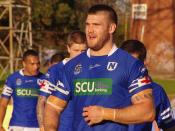"Fight Club"ÃÂ: The Pentecostal Church I attended the lecture by Dr. Mary Alice Morgan entitled "'Fight Club' and the Feminization of America"ÃÂ on September 12, 2001. Dr. Morgan is a member of the Department of English at THE University specializing in gender and African-American studies. She is a very eloquent speaker and extremely knowledgeable of her subject. This lecture was not only informative, it was also truly entertaining because it involved the discussion of a popular movie, "Fight Club"ÃÂ, and its real-world connection to generalized male rage and the feminization of the American male. Dr. Morgan explained how the underground "fight clubs"ÃÂ became like pentecostal churches that gave a sense of "salvation"ÃÂ through the togetherness of its participants.
The men can express their anguish through nightly fights. This liberates them from their miserable, pointless lives.
Jack, who is portrayed by Edward Norton, is the main character in this spine-tingling 1999 film.
Jack represents the typical American male. Dr. Morgan stated that Jack as well as the majority of men feel repressed and even feminized because they are forced to put up with jobs they hate, their priorities are misplaced, and they are confused and alone. For instance, Jack is so unhappy that he goes for days on end without sleeping. He is a hopeless insomniac who spends his free time ordering the perfect designer furniture for his high-rise apartment.
Jack's doctor suggests that he should see what real pain is like by attending a support group for testicular cancer patients. At this meeting he meets Bob, a divorced former body builder who was forced to have his testicles removed and who developed large, feminine breasts because of the overproduction of estrogen in his body. Bob's wife and children left him and he comes to the support group to share his suffering with others that can relate to the problem. Bob represents the actual, physical feminization of men through his appearance, but also intellectual feminization by attending the support group. Today's culture is teaching us that "It is ok to cry,"ÃÂ and men should hide their masculinity. The men in the support group seem to be feminized as they hug one another and cry with each other to overcome their misery. Jack sleeps that night and becomes a "sentiment junkie"ÃÂ who goes to every support group meeting in the city. Soon he meets another support group addict named Marla. Jack is trapped in a boy's world and in a state of cultural alienation. He is attracted to Marla as she destabilizes his world and brings out the character of Tyler Durden that lives within him. In a sense, Tyler Durden exists in every man. He is the masculine stereotype and everything that Jack wants to be, explained Morgan. Tyler is sexually self-confident, aggressive, and physically attractive. When Jack and Tyler Durden (Brad Pitt) eventually establish fight clubs, they are a form of "masculine support groups."ÃÂ This club meets secretly under the cover of night, and allows men to pulverize one another in a semi-orderly setting. By boyishly participating in these "good clean fights,"ÃÂ each common man can feel important if only just for ten minutes.
After many weeks, the fight club evolves into something much less innocent: Project Mayhem. As a part of Project Mayhem, the men of fight club attack symbols of American mass consumerism. For example, they targeted and destroyed buildings that housed the offices of major credit card companies. Project Mayhem is clearly an anticonsumerist terrorist group that only targets organizations that they think are oppressing them. When the movie was released in 1999, an audience may have cheered for these mischievous, misunderstood terrorists, but today, two days after the most devastating terrorist attack in America's history, viewers may now think differently of this band of radicals. We now know that the bombing of a metropolitan area in our country is not just a scene from movies, it can really happen. Dr. Morgan explained that "Fight Club"ÃÂ glamorizes "male rage."ÃÂ This is the same masculine rage that is seen in school shootings, gang related crimes, and rapes. Is this just another example of the typical male aggressive stereotype, or do men really feel repressed and need to be part of a group to express their feelings in order to be satisfied with their life? During Dr. Morgan's lecture I began to think that men must feel like they need to be a part of some group, whether it is by attending a Promise Keeper's Rally in Washington D.C. or being a member of an anticonsumerism terrorist group that destroys corporations. Dr. Morgan believes that our society may be overreacting about the traditional male behavior. She illustrated that during the early 1900s, as the nation's economy was moving from agrarian to industrial, men felt that their masculinity was being threatened. The quality of manhood did survive and I believe it is still alive today.
Prior to attending this lecture, I had no idea that the issue of gender role reversal in American society existed, much less as the theme of one of the most intriguing movies I have ever seen. Dr. Morgan made me think about issues that I have never considered before, such as the previously mentioned gender role reversal, American males feeling repressed, and the glamour of "male rage"ÃÂ. I agree to some extent that males are being punished in a world of feminist ideals.
I can see why they would want to be part of groups to keep their manhood alive. I think that all males have not been feminized yet. Sports, some television, and movies have helped to keep masculinity part of American men. Although I believe that Dr. Morgan's view on support groups like Bob's is accurate in that they can cause men to act more effeminate, I also think that they are extremely helpful to men with problems. I think in moderation, these organizations can assist men in putting their lives back together, whether it is by dealing with an addiction, a death in the family, or even their own eminent death.
This lecture helped to teach me what college is all about. An interdisciplinary discussion relating a movie to reality is nothing like one would experience in a high school English or literature class. Dr. Mary Alice Morgan constantly held my attention, and I found myself waiting on the edge of my seat to hear every word. In fact, I am planning to attend every lecture possible in this series, required or not.





